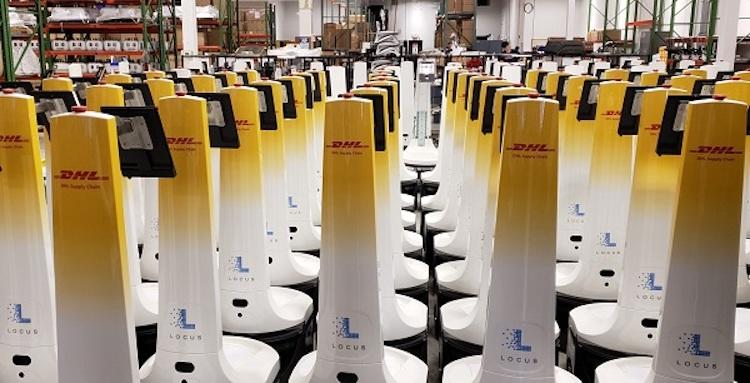
Fulfillment is the side of ecommerce we don’t often see, but it’s one of the industries that was booming before the pandemic and is now positively exploding. Case in point, the U.S. may need to add a whopping 1 billion square feet of warehouse space by 2025 to keep up with online demand.
That’s good news for developers of automation solutions for the logistics sector like Locus Robotics, which makes autonomous mobile robots (AMR) for fulfillment warehouses. The company just announced $150 million in Series E funding bringing its overall valuation to $1billion. Locus will use the funding to accelerate product innovation and global expansion as warehouses continue to face ongoing labor shortages, exploding e-comm volumes, and ever-greater demand for speed and reliability in their technology deployments. A Locus spokesman told me the company expects that over a million warehouse robots will be installed over the next four years while the number of warehouses using them will grow ten‐fold.
“This new round of funding marks an important inflection point for Locus Robotics,” said Rick Faulk, CEO of Locus Robotics. “Warehouses facing ongoing labor shortages and exploding volumes, are looking for flexible, intelligent automation to improve productivity and grow their operations. Locus is uniquely positioned to drive digital transformation in this enormous global market.”
What’s striking about this unicorn story is that Locus is still a relatively small player in the wild west space of mobile robots. Locus’s various warehouse robots, which operate collaboratively with human workers to improve piece-handling productivity, serves around 40 customers and 80 warehouses around the world. Locus’s Series E was led by Tiger Global Management and BOND, big players in technology investing, and builds on support from existing investors including Scale Venture Partners and Prologis Ventures, the venture capital arm of Prologis.
“The logistics industry is facing huge challenges as it struggles to cope with rapid increases in demand, and at the same time severe labor shortages,” said Ash Sharma, Managing Director at Interact Analysis, a market research firm covering the intelligent automation sector. “Warehouses are massively under-penetrated today, but increasingly operators are seeing the huge benefits that warehouse robotics such as the Locus solution can bring. As a result, we expect that over a million warehouse robots will be installed over the next four years and the number of warehouses using them will grow ten-fold.”
One Locus competitor, Fetch Robotics, led by robotics pioneer and Willow Garage alum Melonee Wise, has raised nearly $100M.
“The competitive pressures for excellence in logistics have never been greater,” Wise said in 2019. “Our autonomous mobile robots and cloud platform enables our customers to meet their customers’ demands while meeting their own financial objectives.”
The two companies are now competing for market share in a global commerce paradigm that’s been completely redefined by digital and a consumer base that demands fast fulfillment.























